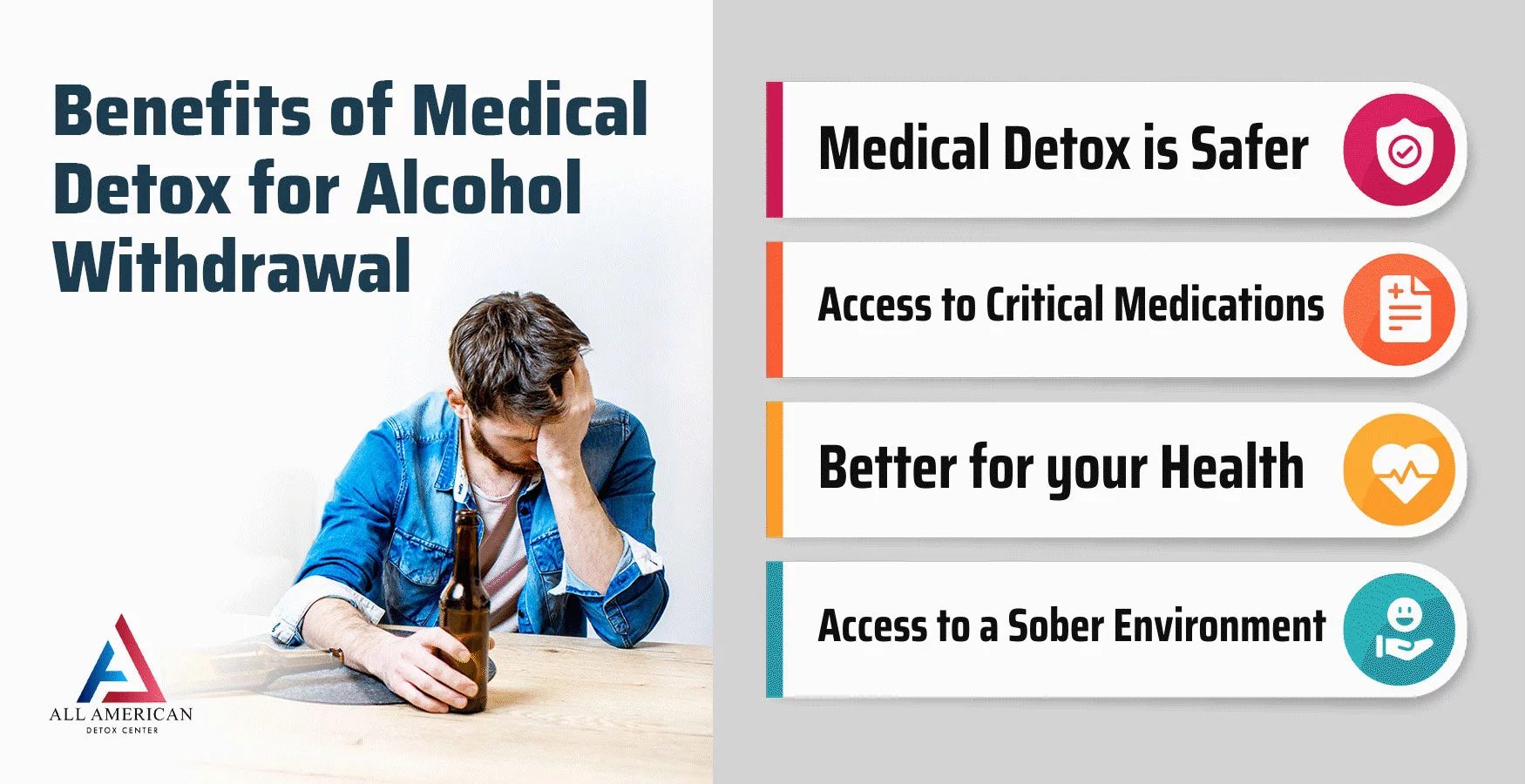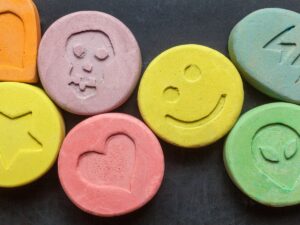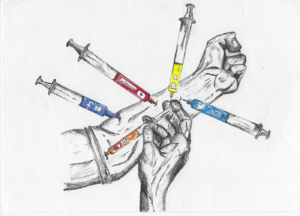What is a Medical Alcohol Detox?
Detox is the process by which your body rids itself of harmful chemicals. This process naturally occurs in our bodies all the time as we consume and come in contact with things that our body doesn’t need.
When somebody abuses drugs and alcohol regularly, however, toxicity builds up overwhelming the body. This in conjunction with physical and psychological dependence creates a need for medical detox treatment. Medical alcohol detox in a treatment setting is usually accompanied by medication, medical monitoring, and counseling.
All American Detox Center is a California-based drug detox center that offers a multitude of recovery options. To find more about alcohol detox centers or other addiction services, contact us at (844) 570-1301.
If you are thinking about quitting alcohol for good, here are some of the Benefits of Medical Detox for Alcohol Withdrawal.
Benefits of Medical Detox for Alcohol Withdrawal
- Medical Detox is Safer
The stronger the alcohol dependency a person develops the stronger withdrawal symptoms will be. People with an alcohol use disorder (AUD) will engage in excessive drinking by drinking throughout the day or in large amounts within a short period of time; also called binge drinking.
Additionally, prolonged use of alcohol can lead to health conditions that could cause complications to the medical alcohol detox process. These include:
- Liver Damage
- Anemia
- Depression
- Seizures
- Dementia
- Hallucinations
- Severe Depression and Anxiety
- Infections
- Heart Problems
- Problems with eating and sleeping regularly
In an Inpatient drug rehab center, a thorough examination is run to guarantee that any methods used during the detox are going to be safe for the patient, and health problems or chronic health conditions can be considered and treated. During your stay, you will also receive 24/7 medical support and monitoring around the clock. This means that if at any point unexpected problems arise, trained staff can effectively respond. This is a huge contrast from home detoxes which can be risky and unsafe.
- Access to Critical Medications and Care
The second benefit of medical alcohol detox, Individuals that who suffer from more severe withdrawal symptoms in an alcohol detox program may be prescribed medication that both ease withdrawal symptoms and prevent them from escalating into more serious health problems.
It is also common for people with AUD to be deficient in several key minerals such as magnesium, phosphate, and sodium (pg. 32) Utilizing IVs, staff can administer appropriate dosages which contribute to the patient’s overall health.
One serious form of alcohol withdrawal that requires medications is delirium tremens. DTs are marked by agitation, aggressive behavior, confusion, seizures, fever, and hallucinations. Delirium tremens develops in 20% of AUD patients in detox and typically last 3-5 days or even up to 10.
The alcohol withdrawals of this disorder are potentially life-threatening and require constant monitoring by medical professionals. For individuals that don’t seek treatment, the risk of death from DTs increases by 15%. Unfortunately, it is fairly common amongst patients in detox; out of all individuals with an AUD that go to treatment, 20% will develop delirium tremens symptoms.
Here are some examples of trusted medications used in alcohol detox treatment:
Benzodiazepines
Benzodiazepines such as Valium or Librium are sedatives prescribed during alcohol detox to treat both physical and psychological acute withdrawal symptoms like insomnia, nausea anxiety, and seizures.
Anticonvulsants
When seizures are the main symptom of focus, doctors can prescribe anti-convulsants. Medications like Tegretol or Neurontin have the advantage of having a lower potential for abuse than benzos and can either be used as a direct replacement for a benzodiazepine or in conjunction with one.
Barbiturates
Barbiturates like Phenobarbital have been found to be effective in treating seizures and other symptoms of alcohol withdrawal both alongside and as a replacement for benzos in alcohol addiction treatment.

- It’s Better for your Health
Putting your treatment in the hands of licensed professionals can maximize the recovery process that benefits your health in several ways including:
- Treating nutritional deficiency with vitamins
- Screening for health conditions common with alcohol misuse (i.e., health failure, disease of the liver and pancreas, nerve damage, and bleeding of the digestive tract) pg.
- A peaceful, anxiety-free environment with kind and supportive medical staff pg.
- Access to medications that can prevent severe withdrawal symptoms associated with AUD
- Access to a Sober Environment
One of the biggest issues with detoxing at home is the high potential for relapse. One of the biggest reasons for this is the lack of a controlled environment.
At home, a person is more likely to be surrounded by triggers. This could include things like unpaid bills, pictures, the presence of drugs and alcohol around the house, or friends and family who may be using themselves.
According to data by the PEW research center, almost half of Americans have a friend or family member who is presently or was at some point addicted to drugs. Considering this, and the fact that alcohol runs in families, we can infer that many people with an AUD live in compromised environments unfit to detox in.
Receiving treatment in a safe medical facility or alcohol detox center in California is the only way to guarantee a safe and sober detox.
- It Prepares You for the Next Stage of Treatment
The biggest barrier to recovery is getting yourself to treatment. Each step you take down the path to recovery helps you to build the resolve and master the skills needed to beat addiction and retake your life. Whether you decide to attend a residential inpatient treatment or an outpatient treatment program, detox is a crucial step in making recovery possible.
So, these are the benefits of medical alcohol detox. Enrolling in an alcohol detox program can be overwhelming at first. During treatment, withdrawal symptoms range from uncomfortable to painful.
Once the detox phase of treatment ends, however, you can take comfort in knowing that the worst is over. The withdrawals of the detox period are replaced with post-acute withdrawals or PAWS which are in most cases more manageable.
You can also read about: How Can a Healthy Diet Help Addiction Recovery?






